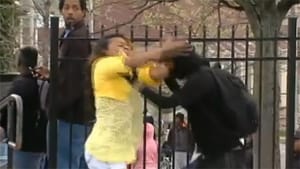Stay in the Loop
BSR publishes on a weekly schedule, with an email newsletter every Wednesday and Thursday morning. There’s no paywall, and subscribing is always free.
Who caused this darkness?
Anger, violence, and the police

First, the Baltimore police employed such excessive force last month in arresting a young black man — whose only apparent crime was to flee when he saw blue uniforms — that he died a week later from his injuries. This seemingly unjustified act of official violence was widely condemned.
Next, a peaceful protest against this violent police act turned violent itself, as angry youngsters looted shops and attacked Baltimore police officers. These acts of random violence were widely condemned as well: Baltimore mayor Stephanie Rawlings-Blake called the rioters “thugs”; President Obama called them “criminals and thugs.”
Then, a video of those riots surfaced in which a black Baltimore mother spotted her own 16-year-old son — wearing a hood and a mask — among the protesters and reacted by grabbing her boy, smacking him several times in the head, and shouting, “Take that fucking mask off!” while the bewildered kid sheepishly retreated.
For this act of parental violence, Toya Graham was widely lionized as America’s “Mother of the Year.” More than 2 million people viewed her one-woman rampage on YouTube. (Click here.) She was invited on the CBS This Morning show. “Forget the National Guard,” trumpeted a New York Post headline. “Send in the moms.” Baltimore’s police commissioner, Anthony W. Batts, praised Toya’s smackdown and added, “I wish I had more parents who took charge of their kids tonight.”
‘I just lost it’
The day after the riot, a large group of volunteers took to the streets of Baltimore to clean up the mess. None of the volunteers was invited onto the morning talk shows, and few were celebrated in the media.
And the lessons are…
- Violence is an effective antidote for violence, especially when the right people practice it.
- Anger and violence are useful tools for good parenting as well, especially if the kids are black. Humiliation helps, too.
- When responding to injustice and adversity, women need to emulate men — preferably macho men like John Wayne, Arnold Schwarzenegger, and Steven Seagal.
Curiously, one person who declined to join in last week’s glorification of Toya Graham was Toya Graham herself. “To see my son come across the street with a rock in his hand, I think at that point, I just lost it," Toya Graham said on CBS This Morning. When the video went public, she said, her first thought was, “Oh my God, my pastor is going to have a fit.”
Police culture
To be sure, when dealing with her kids, a poor single mother can be forgiven for failing to emulate Jesus, Gandhi, Martin Luther King Jr., or Mother Teresa — none of whom, come to think of it, provided much in the way of parental role models. “If the soul is left in darkness,” Victor Hugo observed more than 150 years ago, “sins will be committed. The guilty one is not he who commits the sin, but he who causes the darkness.” Toya Graham was one such soul, but so was her protesting son — each trying, in his or her limited way, to respond to perceived threats and injustices.
But the same could be said of the police in Ferguson, New York, Cleveland, South Carolina, Tulsa, Chicago, and Baltimore: each the scene of recent egregious police brutality, yet each a place where police perceive themselves as increasingly embattled. Although crime has fallen across America since the 1990s, The Economist noted recently, police culture has remained fiercely defensive: Over time, what was once a justified alertness to danger may have warped into a belief that the swift use of force is the only thing keeping cops safe. (Click here.) TV shows like Law and Order reinforce the notion that the police represent the “thin blue line” protecting civilization from anarchy. Although policing has shifted more toward social work and people skills — handling domestic disputes or demented street people, persuading people to do the right thing (as opposed to forcing them to) — most police recruits continue to sign up for the wrong reasons, namely, the chance (as The Economist puts it) “to use violence against bad people in a way that ordinary civilians never can, except in video games.”
Lincoln’s solution
But this too shall pass. For decades, political candidates have competed to demonstrate their toughness against murderers, rapists, and drug dealers, but no more: The New York Times recently noted the virtual disappearance of tough-on-crime talk among the present crop of presidential candidates, Democrats and Republicans alike. Instead, they’re all advocating ideas to rethink America’s criminal justice system, for example, by easing mandatory minimum sentences, expanding drug treatment as an alternative to prison, or releasing nonviolent offenders pending trial without bail. Police departments themselves are concluding that the use of force is often counterproductive.
In her BSR response to the Baltimore riots, Maria Thompson Corley cites several incidents in which potentially violent confrontations were defused by simple expressions of sympathy or kindness. (Click here.) It makes you wonder how much trouble might be avoided if, say, police smiled and chatted people up more; if they looked upon civilians as the clients who pay their salaries instead of as threats to their authority; if they wore blazers instead of military uniforms; if they valued social-work credentials over good marksmanship; if they relied on persuasion more than force.
“I destroy my enemy when I make him my friend,” Lincoln famously remarked. That scenario might not make for a gripping YouTube video. But it would be something different.
Sign up for our newsletter
All of the week's new articles, all in one place. Sign up for the free weekly BSR newsletters, and don't miss a conversation.

 Dan Rottenberg
Dan Rottenberg